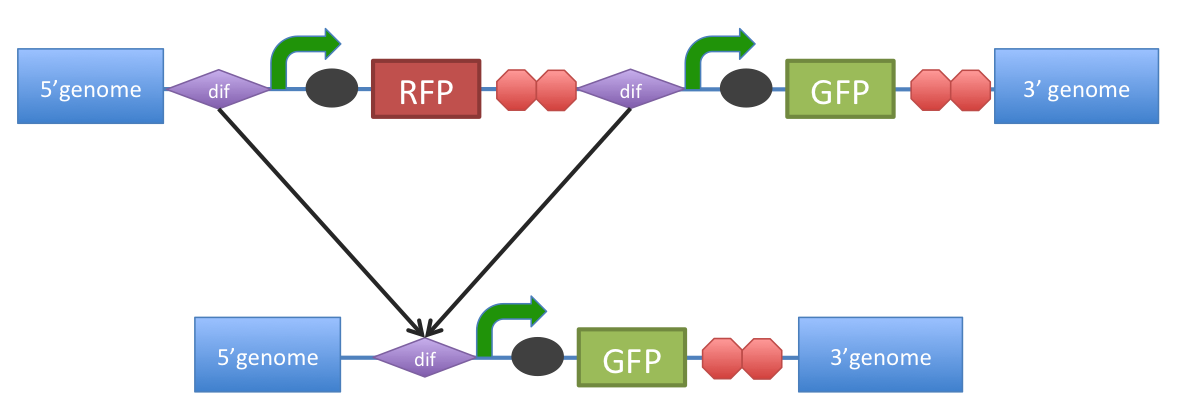Difference between revisions of "Part:BBa K316002"
(→Figure 1. Removal of a specific gene from a genome integrated construct.) |
(→B. subtilis dif: recognition site for sequence-specific endogenous recombinases) |
||
| Line 5: | Line 5: | ||
In cells with circular chromosomes, recombinatorial repair and homologous recombination can generate multimeric chromosomes <cite>1</cite>. ‘’Dif’’ sites are part of a system to ensure that multimeric chromosomes can be separated to monomers, which is required for proper sharing of genetic material between daughter cells. | In cells with circular chromosomes, recombinatorial repair and homologous recombination can generate multimeric chromosomes <cite>1</cite>. ‘’Dif’’ sites are part of a system to ensure that multimeric chromosomes can be separated to monomers, which is required for proper sharing of genetic material between daughter cells. | ||
| − | In | + | In ''B. subtilis'' the tyrosine family recombinases such as RipX and CodV mediate the separation at 28-bp sequence Bs’’dif’’ <cite>1</cite>. The site-specific recombinases are able to recognize two directly repeated ’’dif’’ sites and excise the fragment flanked by the two sites <cite>2</cite>. |
Revision as of 16:07, 25 October 2010
B. subtilis dif: recognition site for sequence-specific endogenous recombinases
In cells with circular chromosomes, recombinatorial repair and homologous recombination can generate multimeric chromosomes 1. ‘’Dif’’ sites are part of a system to ensure that multimeric chromosomes can be separated to monomers, which is required for proper sharing of genetic material between daughter cells. In B. subtilis the tyrosine family recombinases such as RipX and CodV mediate the separation at 28-bp sequence Bs’’dif’’ 1. The site-specific recombinases are able to recognize two directly repeated ’’dif’’ sites and excise the fragment flanked by the two sites 2.
Figure 1. Removal of a specific gene from a genome integrated construct.
The site-specific recombinases, endogenous to B. subtilis strains are able to recognise Bs’’dif’’ sites and recombine out the strand of DNA directly flanked by the two sites. Recombination leaves a single dif site.
The hypothetical construct in Figure 1, is assumed to have been previously engineered to homologously recombine into the genome of B. subtilis. Integration sequences such as amyE BBa_K143001, BBa_K143002 can be used to achieve this.
Sequence and Features
- 10COMPATIBLE WITH RFC[10]
- 12COMPATIBLE WITH RFC[12]
- 21COMPATIBLE WITH RFC[21]
- 23COMPATIBLE WITH RFC[23]
- 25COMPATIBLE WITH RFC[25]
- 1000COMPATIBLE WITH RFC[1000]
References
<biblio>
- 1 pmid=11208805
- 2 pmid=16597952
http://2010.igem.org/Team:Imperial_College_London
</biblio>References

